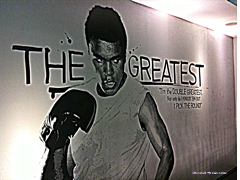Pulling the Curtain Back on Corruption in Combat Sports
The corruption in combat sports runs deeper than the darkest recesses of your imagination and even extends into the most trusted sources in the mixed martial arts and boxing media communities today. The truth about professional boxing and mixed martial arts increasingly begins to come full circle back to their professional wrestling counterparts once any judicious study is undertaken of the sport as the entrenched journalistic elite studiously work to paint a sunshine and rainbow pseudo version of reality for their viewership audience. Unbeknownst to the vast majority of the casual combat sports community, the very people trusted to bring them the very best, up-to-date and most accurate information are in many cases actively engaged in a conspiracy of silence to suppress the truth regarding corruption in combat sports.
According to the 2016 award winning documentary, “Dirty Games – The Dark Side of Sports,” investigative journalist Benjamin Best interviews former boxing manager Charles Farrell on the topic of corruption in combat sports. According to Farrell, who participated in arranging hundreds of fixed professional boxing matches, “You fix fights to make betting money. You fix fights to get a fighter a championship. You fix fights to maneuver a fighter up the ranks towards a championship fight. You fix fights to win, in order, again, to position someone strategically. You fix fights to lose, in order to get paid and in order to make, you know, betting coups.
“The way you fix fights varies greatly," explains Farrell. "You fix fights by buying judges, that’s you know, one easy to do it. You fix fights by having the referee working for you, so that if there’s any way that the ref can stop a fight in your guys favor, he does. You fix fights by colluding with the fighters, generally the loser. It’s almost always the loser. Winners almost never know that the fight is fixed,” Farrell explains. With this information in mind, applying what we’ve just learned to real world situations in the ring or cage is they key to being able to identify and understand the difference between legitimate boxing and mixed martial arts contests and those undermined by the hands of corruption.
 “UFC on ESPN 13 brought it,” writes Sherdog.com’s Ben Duffy in his July 16, 2021 article titled, “Opinion: Improve Your Position." But according to the report, “That doesn’t mean there weren’t problems, though, and as is the case far too often, the problems stemmed from the third person in the cage. They were severe enough on Wednesday that I’m bending a personal rule to discuss them. I’ll explain.”
“UFC on ESPN 13 brought it,” writes Sherdog.com’s Ben Duffy in his July 16, 2021 article titled, “Opinion: Improve Your Position." But according to the report, “That doesn’t mean there weren’t problems, though, and as is the case far too often, the problems stemmed from the third person in the cage. They were severe enough on Wednesday that I’m bending a personal rule to discuss them. I’ll explain.”
The Sherdog.com senior editor goes on to write that, “A year or two ago, I was talking with an older (speaking professionally, not chronologically), wiser, veteran combat sports writer. It was immediately after an Ultimate Fighting Championship event and he was brainstorming five lessons that could be learned from the night of fights, for the column by that name. I suggested that there had been awful scorecards turned in that night. He quickly agreed but added, ‘I can’t list ‘officiating sucks’ or ‘judging sucks’ as a lesson learned, because then I might as well list it every single weekend. It feels like too much of a copout.’
“I took that to heart and ever since then, I’ve generally avoided making judging and officiating the main story when reflecting on an event-as the man with the hair pointed out, it’s just too easy to go there,” explained Duffy.
If this information doesn’t alarm you, it should, because you’ve got one of the most influential combat sports news media outlets in the world today essentially admitting to withholding the truth and pertinent information from their viewership in order to satisfy an ideological concept based upon inaccurate and deceptive journalistic practices. It quite literally offers a window into virtually the entire combat sports media community where the journalistic elite actively participate in covering up the corruption endemic to the combat sports entertainment industry today.
Lets take the time to revisit the goldmine of information above from Sherdog.com’s honorable Ben Duffy in an effort fully appreciate and comprehend the combat sports media’s role in the conspiracy of silence in reporting on corruption in mixed martial arts. "As is the case far too often,” writes Duffy, “the problems stemmed from the third person in the cage.” Later, Duffy goes on to explain that, “I can’t list officiating sucks and judging sucks as a lesson learned, because then I might as well list it every single weekend,” in attesting to just how common and widespread of a problem that we’re in fact talking about here.
We’re talking about a systemic problem in combat sports, an issue all too often overlooked or explained away by countless media personalities and outlets alike as incompetence rather than corruption if they even choose to cover the issues at all. And in many cases, these pundits know very well that something isn't on the up-and-up, yet they choose not to report on the truth regardless. To the rest of the world this might sound like an integrity issue, some might even go as far as to call it disseminating propaganda, but it’s actually a common occurrence within the combat sports media community where utilizing those who are either too inexperienced to recognize the truth or those who are all too willing to ignore it stand as standard operating industry procedure.
And while not every weird, strange and out of the ordinary event in combat sports is the result of nefarious acts or intentions, when we’re dealing with an on going issue decades deep in the making which just so happens to rear its ugly head nearly every other weekend - only the deaf, dumb and blind or those on the take themselves with their hand in the cookie jar are going to look the other way as the great deception continues to mount.
"This sport is special, it really is,” legendary boxing trainer Teddy Atlas explained in his August 19, 2020 YouTube video titled, “Teddy Atlas Goes Crazy on Judges, Boxing Corruption after Romero vs Marinez.” According to Atlas, “But then you got these people that corrupt the sport, that's the word. That's why you're not going to see me in certain places, because there's people that don't want that word put out there.” Not only is this true for professional boxing, but it's been my experience in the mixed martial arts community as well where a severe allergic reaction to reality seems to be a common occurrence amongst the sports most popular media outlets. Unless you're selling a sunshine, rainbows and unicorn fantasy to the public few seem to be interested in the truth.
To expand on the taboo subject most mainstream combat sport media outlets dare not explore, according to an August 24, 2020 YouTube interview with UFC legend Jon Fitch on episode #51 of the Dub Jellison Podcast titled, “DANA WHITE & UFC CORRUPT? FIXING MMA BUSINESS & UPCOMING FIGHT ON SEPT 12! w/ Jon Fitch,” when asked about what can be done to change the many problems plaguing the sport today the current Bellator welterweight title contender responded with a short but sweet ready made answer to address the corruption in mixed martial arts.
“Ali Act, Muhammad Ali Act,” responded Fitch. “We have the Muhammad Ali Act in boxing, it was created, it was made into law in 2000 to protect boxers from corrupt promoters like Don King. As dirty and corrupt as Don King is, he was never as powerful as Dana White. Because Don King never owned the title, Don King had to pay the sanctioning bodies off, he had to pay them, which is another corrupt move, but you can at least action that corrupt move and punish him. You can’t do that to Dana because he already owns the title, he doesn’t have to pay anybody off," explained Fitch.
“So, Dana is way more powerful and way more corrupt than Don King ever was. So, we want to expand that to all fighters and that will give us a true place as independent contractors. We would get to look at the money flow, who is getting paid what, how much are they making, how much money are they spending on production. If we know exactly all of the numbers, we can negotiate our pay way better. You know, if I know you’re going to make $20-million dollars off of this, like, well that $2,000 doesn’t seem like much. You’re going to make twenty, $20-million.
“Like, okay, let’s renegotiate that deal a little bit. You know, not being able to use, you know, shitty contracts. ‘Hey, we’ll give you this bout agreement but you have to sign these long-term agreements first.' They do that all the time. They’ll wait until you’re starving and need money and then they’ll offer you a bout agreement.‘Hey, we got a fight for you,’ but you have to sign this 9-fight deal first for shit money or we’re not going to give you the fight and you’re going to have to sit out longer. So, guys, they sign their life away because they need to feed their family. That would be eliminated," explained Fitch.
“You would have independent rankings and titles, so the UFC would no longer control their belt, it would be a sanctioning body like the WBC, IBF, you know, whatever, WBO, there would be something that would control the title and rank.
 “And then lastly, with the Ali Act, the champions. If you become a champion the second you win a title, you’re a free agent. You’re a free agent, you’re at your most valuable, you just won a title. You have the right to go out and find out how much you’re worth. Those are the four things, those four things would change the way that the scope of the sport goes and it would change the money that the fighters were making and it would improve everything for everybody, except the UFC. All of the other promoters would benefit though, the fans would definitely benefit,” explained Fitch.
“And then lastly, with the Ali Act, the champions. If you become a champion the second you win a title, you’re a free agent. You’re a free agent, you’re at your most valuable, you just won a title. You have the right to go out and find out how much you’re worth. Those are the four things, those four things would change the way that the scope of the sport goes and it would change the money that the fighters were making and it would improve everything for everybody, except the UFC. All of the other promoters would benefit though, the fans would definitely benefit,” explained Fitch.
Highlighting the behind the scenes corruption in mixed martial arts and some of the exact same scenarios Fitch mentioned in promotions leveraging opportunities over athletes heads, according to an August 18, 2020 The Hannibal TV YouTube video titled, “Mark Kerr on Fixed PRIDE Fights,” host Devon Nicholson asked MMA legend Mark Kerr about fixed fights in Japan, explaining that, “Rick Bassman has actually told this story to me on here about Mark Coleman taking the 60-grand for his dive in that one PRIDE fight. Were you surprised that Mark did that or was it just a situation where it was good money for him you think?”
“No, it wasn’t money. It was opportunity,” explained the former two-time UFC heavyweight tournament winner and 1992 NCAA wrestling champion. “You know what they ended up doing? And I don’t think Rick realizes this. They held Marks participation in the Grand Prix event over his head if he didn’t take what they were offering. So, if you think about it, Mark had lost like three or four fights before the Takada fight and the only way they were going to allow Mark to move forward was to say, ‘Hey, we’re going to match you up with Takada. Good news, we’ll get you into Pride. And, bad news…you’re going to lose," recalled Kerr.
“And you know, I think, I just think that if there had been another way, I know that Mark would have took the other way. But if he didn’t agree, my understanding is that if he didn’t agree to take a dive with Takada that he would not have been allowed to participate in the Grand Prix and that his fighting days would have been over. So, if you look at it from his perspective, father, two young kids, two young girls, and the UFC was closed to him at that point and so the only thing that he had is that he’s got to try PRIDE. So, I honestly can’t fault him you know? And when presented with similar circumstances, I can’t say that I would have done any different.
“I know that he had a lot on his plate, I know that he regrets it. I know that it’s a huge regret of his and I think that he’s stated that publicly. And it’s just something where, I just know, I’ve known Mark for twenty, god man, I’ve known him since 1992. I’ve known him for thirty years. You know, we come from the same general area in Ohio, it’s just that I know that, I know that if there was a different way to do it, I know that he would have did it a different way and I know that he regrets it,” explained Kerr.
With the widespread codification of romanticized lies in place of reality in the combat sports media, the boxing and mixed martial arts communities are increasingly forced to rely on independent media sources in order to get their daily dose of truth in the face of the modern corporate Kool-Aid currently saturating combat sports today. The very people in a position to do something about the systemic corruption in combat sports are themselves actively engaged in a conspiracy of silence to suppress the truth as questionable journalistic practices force reality into the rear view mirror as a sunshine and rainbow pseudo version of reality is conjured up for their viewership audiences. With professional boxing and mixed martial arts increasingly coming full circle back to their theatrical professional wrestling counterparts roots; the corruption in combat sports runs deeper than the darkest recesses of your wildest imagination.





